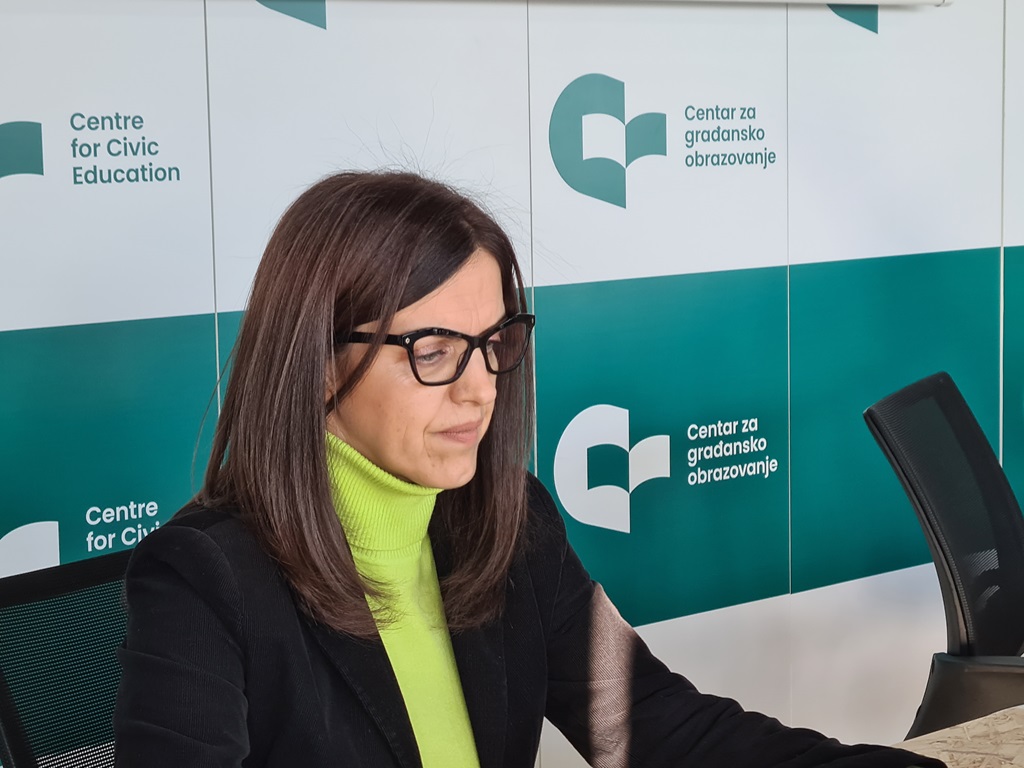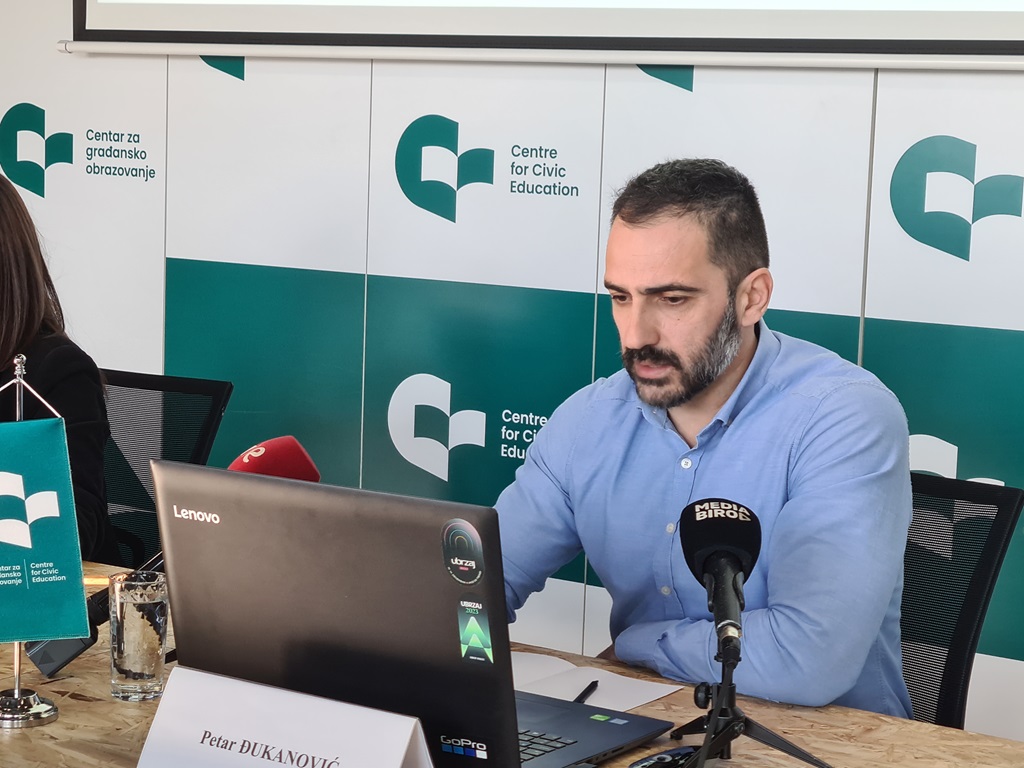Non-governmental organizations generate a positive perception among the citizens of Montenegro, along with an increase in their expectation to be critical towards the authorities. Negative campaigns led by politicians against critically oriented NGOs also result in a perception of a narrowed space for the free operation of NGOs. Civic activism is on the decline, accompanied by citizens’ disbelief that their actions can bring about change. The slow pace of Montenegro’s European integration leads to scepticism about ever becoming a member of the EU – these were, inter alia, some of the findings revealed at the presentation of the findings of the public opinion research on the role of civil society in the process of democratization and Europeanization of Montenegro, conducted by the Centre for Civic Education (CCE) and partners, under the project “CSOs in Montenegro – from basic services to policy shaping – M’BASE”, supported by the EU Delegation to Montenegro and the Ministry of Public Administration.
The findings are compared with the research from the 2021 to identify certain trends or changes.
“Citizens’ trust in institutions is increasing, although none enjoys the highest level of trust. Religious communities lead with a rating of 2.72, followed by the police and the education system (2.6), healthcare (2.57), and the President of the state (2.55), while the media and political parties are at the bottom of the list, and the prosecution records a significant improvement compared to 2021,” said Snežana Kaluđerović, a Senior Legal Advisor at the CCE.
Kaluđerović clarified that the healthcare system is recognized as the most responsible for well-being of society, followed by the Government and the Parliament, while the education system is seen as more responsible compared to the previous wave.
“Unemployment is still perceived as the most important issue, albeit less than before, followed by the fight against corruption and organized crime, as well as improving the standard of living, with the highest recorded increase in the perception of problems in the field of education,” she emphasized.
The research results indicate that the public recognizes a broader spectrum of actors as part of civil society, whereas NGOs were previously dominant. Now, the activities of foundations, unions, media, professional associations, activists, coalitions, networks, and volunteer associations are highlighted. There is a notable shift in awareness of the civil sector, with information most commonly obtained via TV, portals and social media.
“The majority of more than 50% of respondents positively assess the work of NGOs, marking an increase compared to previous research. The most important factor shaping the opinion about NGOs is their activities, common to both waves of research. However, there is a noticeable decline in the positioning of this factor and a parallel significant rise in factor – impact on society. The attitudes of leaders of certain NGO, funding sources, and employees of certain NGO have become more significant in shaping the opinion about an NGO,” Kaluđerović noted in her reflection on this part of the research.
“It is concerning that civic activism is declining, and the number of those who do not believe their actions would change anything is growing. Also, there remains a low level of interest among citizens to participate directly in the activities of and NGOs they support,” Kaluđerović emphasized.
“Attitudes towards NGOs have changed from 2021 to 2024 in relation to various actors, interests, and goals. About one-fifth (20.2%) of citizens believe that NGOs are completely or partially independent from the Government, marking a decrease of over 12% compared to 2021. A similar trend is observed regarding independence from political parties, while the number of undecided on this issue is increasing. Regarding the role of NGOs as a corrective to the government, over one third believe that NGOs attempt to fulfil this role, but there is also a growing number of those who do not share this opinion, with over one-fifth now holding such views. This is followed by the perception that NGOs were critical of the previous government, but less now. However, the majority still agrees that NGOs fight for justice and human rights,” commented Petar Đukanović, Programme Director of the CCE, on the research findings.
The percentage of those who believe that NGOs promote European values is decreasing, with an increasing number of undecided individuals on this issue. The perception that NGOs serve the personal interests of individuals is decreasing, as is the perception of the importance of the role of NGOs in society. “Currently, 38.2% of citizens believe that NGOs work in the public and citizens’ interest, which is lower than the previous wave in 2021 (45.1%). The perception that NGOs work in the interest of their leaders, political parties, and the Government has increased,” Đukanović stated.
“Although the fight against corruption remains the most recognizable area of NGO activity, there is an enormous drop in the perception of this activity, from 32% in 2021 to 14.2% in 2024. Social care and humanitarian work are becoming much more visible NGO activities, as well as the fight against drug addiction and alcoholism, European integration and the promotion of democracy, monitoring the work of the Government and local authorities. There is also a considerable increase in the recognition of activities in raising awareness of citizens’ rights, women’s rights, ecology, education, etc. At the same time, citizens believe that stronger NGOs engagement is needed in all these areas, especially in addressing issues in education,” explained Đukanović.
In 2024, there is an increase in the number of those who believe that NGOs mostly have an influence or a significant influence on improving the state of Montenegrin society – now at 47%, while the number of those who think that NGOs have no influence is slightly decreasing.
“There is a noticeable increase in the belief that NGOs should be sharp critics of the Government and state authorities – from 38.1% in 2021 to 45.7% in 2024. The number of those who see the most important role of NGOs in monitoring the Government’s work has decreased, and the percentage of those supporting the involvement of NGOs in drafting laws and strategies remains unchanged. The positive characteristics of NGOs are growing, with NGOs predominantly perceived as modern, successful, reliable, fast, accessible, supportive, expert, important, and necessary. Half of the citizens (50%) believe that NGOs are mostly or very transparent in their work, which is at the same level as in 2021,” stated Đukanović.
As in the previous wave, citizens cited the Government as a key actor in promoting democracy in our society, with slightly decreased expectations, followed by educational system, the President of the state, the media, and NGOs which record a growth in this aspect compared to 2021.
“The most important issues that NGOs address in the democratization and Europeanization of society are positioned as human rights, independence of the judiciary and the rule of law, with the note that percentages of importance of these topics vary compared to the previous wave. The fight against corruption is also highlighted, and there is a significant increase in the perception of the importance of the responsibility of political decision-makers, while there is also growth around the issue of dealing the past,” emphasized Petar Đukanović.
International donors are recognized as the main source of funding NGOs, primarily EU funds, while the Government is less frequently mentioned as the main donor. Also, when asked who should support NGOs, citizens name the European Union/EU funds and the Government.
In relation to the previous two Governments’ attitudes towards NGOs, the findings indicate that Abazović’s Government generally did not have a differentiated stance towards NGOs, or it was more open than the previous governments. However, cumulatively prevails the perception that it was selective in cooperation, favouring suitable NGOs and leaders while having a negative stance towards others and engaging in direct conflicts with NGOs. For now, Spajić’s Government is perceived as much more open to NGOs, but a high percentage of those who believe that it does not have a clear stance towards NGOs. There is also a perception of selectivity in the approach to NGOs, viewing part of the NGO sector as enemies but without direct conflicts.
Perceptions of cooperation between the Government and NGOs are mostly divided, with an increase in those who consider this cooperation satisfactory (from 26.9% to 34.4%), but also with an increase in those who see it as poor (from 24.5% to 28.8%).
“The number of those who believe that there are not enough conditions for the development of NGOs that freely criticize the government has increased (from 36.8% in 2021 to 43.1% in 2024), while simultaneously, the number of those who believe that this freedom is not endangered has decreased (from 38.3% in 2021 to 33.4% in 2024). This indicates that citizens recognize negative campaigns that decision-makers have conducted against critically oriented NGOs,” concluded Đukanović.
“Compared to the 2021 research, there is a decline in support for Montenegro’s EU Membership (from 77.3% to 70.3%) and a positive attitude towards the EU (from 82% to 73.8%), with an increase in those who have mostly or very negative attitude (from 13.3% to 17.2%). The majority of almost 60% believe that Montenegro is moving slowly or very slowly towards the EU, but this percentage is still lower than in 2021. Slightly more than a quarter (28%) believe that Montenegro will become an EU member in five years, a quarter believe it will happen in 10 years, 13.8% believe it will take 20 years, and almost one fifth believe that we will never become an EU member. Over two-fifths believe that NGOs have expertise/knowledge in the field of European integration, which is a slight decline. Almost two-fifth of respondents, similar to the previous research, believe that authorities do not take into account the views of NGOs regarding the European integration process and Montenegro’s obligations on that path,” said Snežana Kaluđerović in her overview of the findings on Montenegro’s EU integration.
The Government is seen as the most responsible for the dynamics of the accession process, followed by the Parliament, the judiciary, with an increase in the perception of the responsibility of political parties and prominent individuals.
The research was conducted from 18 to 24 January 2024, with the application of the CAPI method, on a stratified three-stage sample of 1012 respondents. The expert support in conducting this research was provided by the DAMAR agency.
The project “CSOs in Montenegro – from basic services to policy shaping – M’BASE” is implemented by the Centre for Civic Education (CCE), in partnership with the Friedrich Ebert Stiftung (FES) from Germany, NGO Center for the Protection and Research of Birds (CZIP) and NGO Politikon Network from Montenegro, in cooperation with the Ministry of Public Administration and Ministry of European Affairs the Government of Montenegro. The project is financed by the European Union and co-financed by the Ministry of Public Administration.
Maja Marinović, Programme Associate



